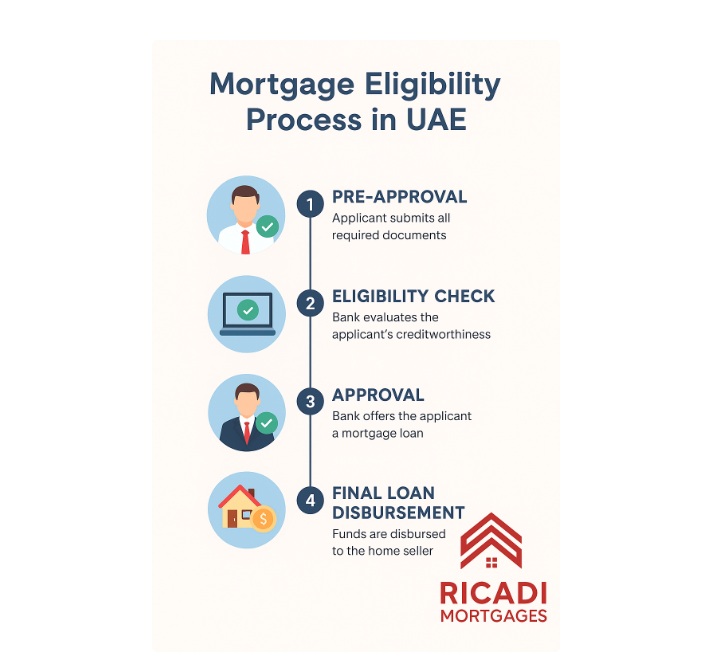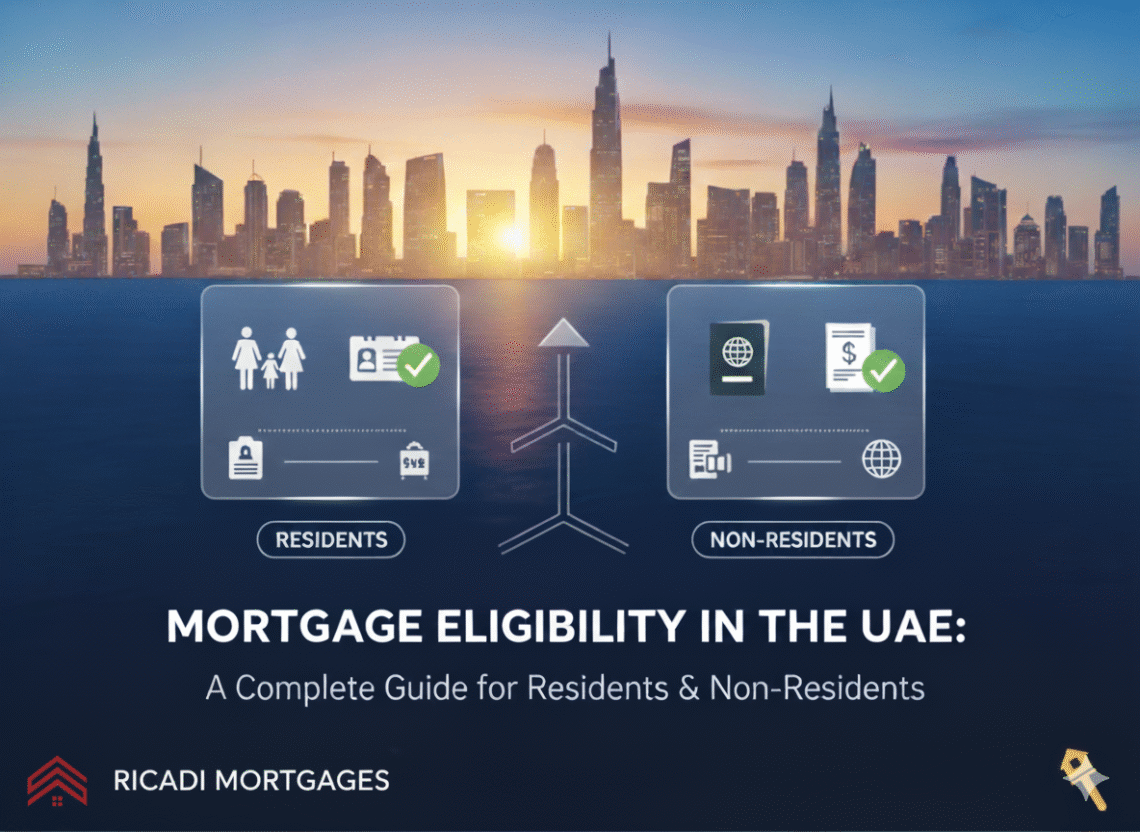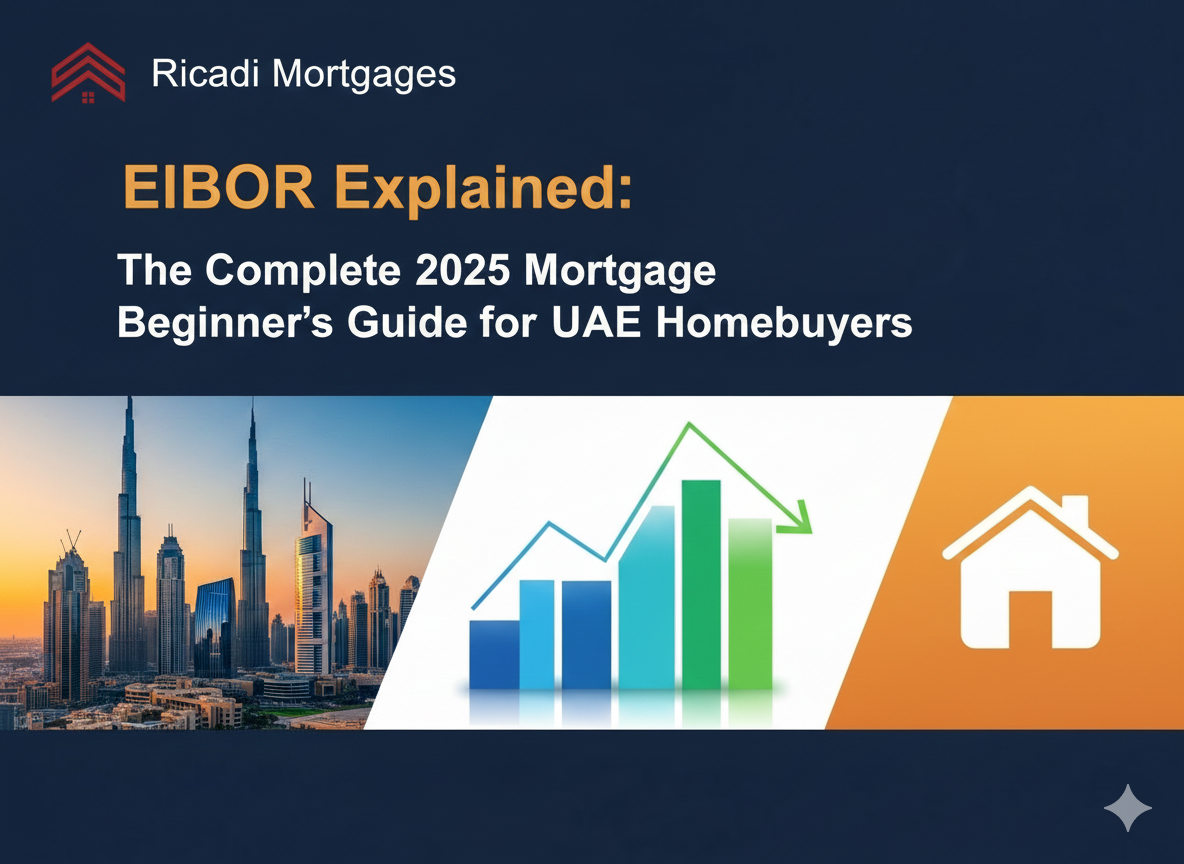Understanding mortgage eligibility in the UAE is the first step for anyone planning to buy property in Dubai, Abu Dhabi, or other emirates. Whether you are a resident, a salaried professional, a self-employed entrepreneur, or a non-resident investor, mortgage approval depends on specific rules, financial criteria, and documentation. In this comprehensive guide, we’ll break down eligibility requirements, the process, documents needed, costs involved, and even solutions for complicated or special cases.
Why Mortgage Eligibility Matters in the UAE
* Determines how much financing you can secure.
* Impacts interest rates and repayment terms.
* Helps you prepare financially before approaching banks.
* Avoids delays or rejection due to missing requirements.
1. Basic Eligibility Criteria for UAE Mortgages
a) Age Requirement
* Minimum age: 21 years
* Maximum age at loan maturity: usually 65 (salaried) or 70 (self-employed), though this varies bank.
b) Residency Status
* UAE Residents: Have access to higher financing ratios (up to 80% for first property).
* Non-Residents: Financing is available, though typically up to 50–60% of the property value.
c) Minimum Income Requirement
* Salaried employees: AED 10,000–15,000 monthly income (varies bank).
* Self-employed: Must show consistent business income and bank statements.
d) Employment/Business Stability
* Salaried: At least 6 months with current employer.
* Self-employed: Minimum of 2 years business history.
2. The Mortgage Eligibility Process in UAE
1. Pre-Approval Application – Submit documents for initial bank assessment.
2. Eligibility Check – Bank evaluates income, liabilities, and credit score.
3. Approval-in-Principle – A letter confirming how much you can borrow.
4. Final Approval – Once property is selected, valuation and due diligence are done.
3. Documents Required for Mortgage Approval
For Salaried Residents:
* Valid Emirates ID & Passport
* Visa copy (if expatriate)
* Salary certificate
* Last 6 months’ bank statements
* Payslips (where applicable)
For Self-Employed:
* Trade license copy
* Company financials
* 6–12 months’ personal and business bank statements
* Passport, Visa, and Emirates ID
For Non-Residents:
* Passport copy
* Proof of income from home country
* International bank statements (6–12 months)
* Tax returns (where applicable)
4. Mortgage Eligibility for Non-Residents in UAE
* Loan-to-Value ratio: usually 50–60% of property value.
* Limited lender options compared to residents.
* Required to have all documentation notarized and sometimes attested.
* Income proof from overseas employers is mandatory.
5. Buy-Out Mortgages (Moving Loan to Another Bank)
If you already have a mortgage and wish to shift to a bank with lower interest rates:
* Eligibility check is repeated the new bank.
* Outstanding loan balance is taken over.
* Buy-out can help reduce monthly repayments significantly.
6. Expenses & Costs Associated with Mortgage Process
* Bank Processing Fee: 0.5–1% of loan amount.
* Valuation Fee: AED 2,500–3,500.
* Land Department Fee: 4% of property value.
* Mortgage Registration Fee: 0.25% of loan amount.
* Insurance: Life and property insurance are mandatory.
7. Complicated or Special Cases
a) High Debt Burden Ratio
If your monthly obligations exceed 50% of income, eligibility may be restricted.
Solution: Clear existing loans or consolidate debts before applying.
b) Gaps in Employment or Business History
Solution: Provide additional financial proofs like savings, investments, or rental income.
c) Non-Standard Income Sources
Freelancers or commission-based professionals may face challenges.
Solution: Show consistent earnings through bank statements.
8. Tips to Improve Mortgage Eligibility in UAE
* Maintain a strong credit score (over 700 recommended).
* Pay off personal loans and credit card debt.
* Ensure income is routed through a bank account.
* Save for a higher down payment to reduce financing need.
* Get pre-approval to understand your borrowing limit.
9. Key Takeaways
* Mortgage eligibility depends on age, income, residency, and credit history.
* Residents can borrow more compared to non-residents.
* Proper documentation ensures smoother approval.
* Buy-out mortgages and refinancing options are available.
* Understanding fees upfront helps you budget better.
Final Thoughts
Mortgage eligibility in the UAE doesn’t need to be overwhelming. With clear preparation, the right documents, and guidance from experts like Ricadi Mortgages, you can secure the financing you need with confidence. Whether you are a first-time homebuyer in Dubai, an expat investor in Abu Dhabi, or a non-resident seeking opportunities in UAE real estate, eligibility is the foundation of mortgage success.
Looking to check your mortgage eligibility today? Connect with Ricadi Mortgages for a personalized consultation and discover the best financing options tailored to your goals.

FAQs on Mortgage Eligibility in the UAE
1. What is the minimum salary required for a mortgage in UAE?
Most banks in the UAE require a minimum monthly salary of AED 10,000–15,000 for mortgage eligibility. Some lenders may offer options starting from AED 7,000 if the applicant meets other criteria.
2. Can non-residents apply for a mortgage in Dubai or Abu Dhabi?
Yes, non-residents can apply for a mortgage in the UAE. However, financing is usually limited to 50–60% of the property value, with stricter documentation and fewer lender options compared to residents.
3. What documents are required to get mortgage approval in UAE?
Key documents include passport, Emirates ID, visa copy, salary certificate or trade license, 6–12 months’ bank statements, and payslips or company financials. Non-residents also need notarized overseas income proof.
4. How do I improve my mortgage eligibility in UAE?
Maintain a high credit score, reduce debts, ensure stable income flow, and save for a larger down payment. Getting pre-approval from banks also boosts chances of quick approval.
5. What are the main costs involved in getting a mortgage in UAE?
Expenses include bank processing fees (0.5–1%), property valuation fees (AED 2,500–3,500), Dubai Land Department fee (4% of property value), mortgage registration fee (0.25% of loan amount), and mandatory insurance.
6. Can I transfer my mortgage to another bank in UAE?
Yes, this is called a buy-out mortgage. The new bank takes over your existing loan, often at a lower interest rate, helping reduce monthly repayments. Eligibility checks are repeated during this process.
7. What happens if my income is variable or from freelancing?
Banks prefer steady income, but freelancers or commission-based professionals can qualify providing consistent bank statements, tax returns, and proof of ongoing contracts or clients.
8. Up to what age can I apply for a mortgage in UAE?
Applicants must be at least 21 years old. At loan maturity, the maximum age is usually 65 for salaried individuals and 70 for self-employed, depending on the bank.






